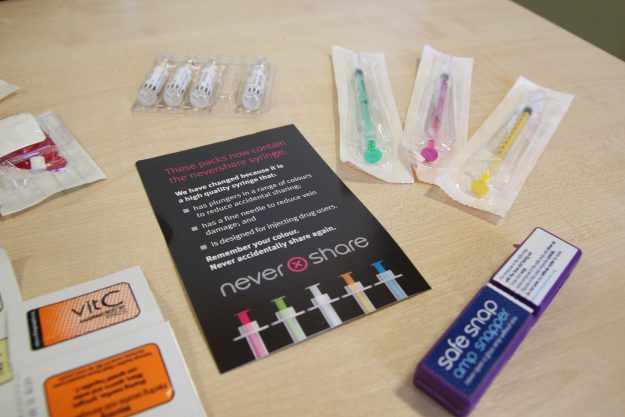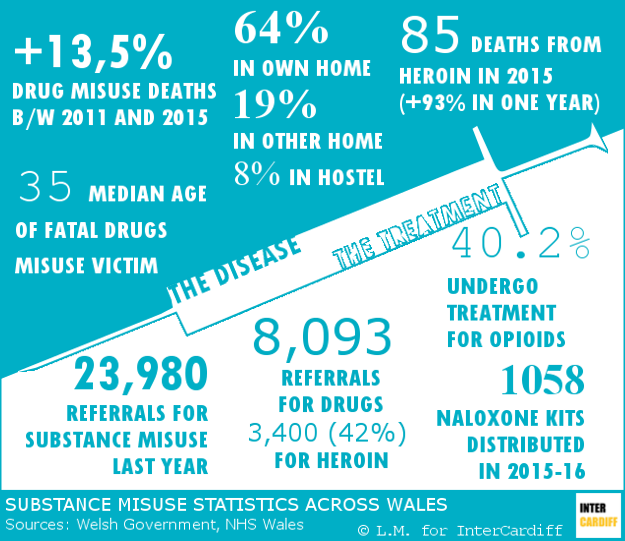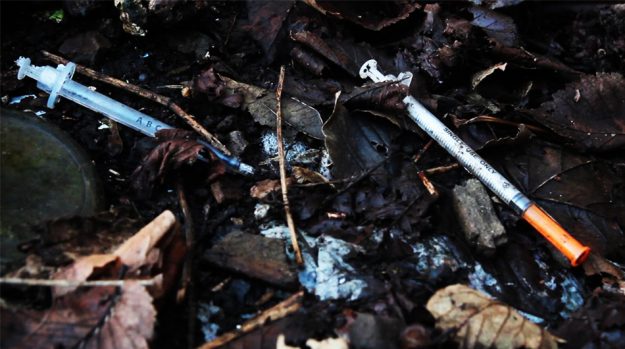More than 4,600 deaths from drug misuse were registered in Wales between 2001 and 2015. Cardiff and Swansea constitute only 19% of the country’s population, but together they account for almost 30% of the deaths.
This is the experience of the people chipping away at those numbers.
On a steep roadside hill in Swansea, I make my way among the mud. The ground is filled with all sorts of litter: sleeping bags, beer cans, syringes, cookers, even a trolley luggage. “They call this place the Jungle,” Sam, my guide, tells me. “If you overdose here, alone, it’s over. Nobody’s going to find you in time.”
Once a week, Sam and his colleagues from Drugaid Cymru go on “pickup patrol”: they scout the worse spots for drug litter in Swansea and remove anything that could pose a danger. “It’s actually been cleaner recently,” Sam says. “We find few needles, which is good. It means users are putting them in the sharps boxes we provide.”
The boxes are specifically designed to dispose of used syringes. Once the syringe is in, there’s no way to get it out. That means there’s no risk of anyone – intentionally or accidentally – reusing it to inject another dose.
They’re part of the standard equipment provided by charities like Drugaid, along with injecting water, wipes and differently-coloured syringes. When someone is given a kit, however, it’s not just an impersonal hand-over.
“We always try to give the most appropriate advice,” Sam explains. “For example, we make sure that the needles are the right length. Many heroin users also inject steroids, and they use long needles for both substances. But if you use a long needle when piercing a vein, you may end up damaging it. Most people don’t know that, and try to push the needle all the way in.”
“And of course, we let them know that they can come to counselling anytime.”

The handing-out of kits follows the harm-reduction approach (as opposed to an abstinence-based one) endorsed by the Western Bay Area Planning Board (APB), which includes the councils of Swansea, Neath-Port Talbot and Bridgend. Not doing drugs at all is a stage that takes time to reach, so before that comes doing drugs safely.
Sometimes injecting in a closed space, like one’s own room, is not an option. That’s where places like “the Jungle” come in. Nevertheless, the vast majority of overdose deaths still happen in private residences, with hostels trailing behind.
Steve Adie, the APB’s Head of Substance Misuse, would see favourably the opening of safe-injection centres (popularly known as “shooting galleries”), where drug users can be promptly assisted in case of overdose. But, as he explains, there’s a hurdle: “The Misuse of Drugs Act, as it stands, prevents it. The police have a duty to take class-A drugs off people. The law would need to change, and the authority to do that rests within Westminster, not Swansea or Cardiff.”
In the meantime, there are other ways to make a difference: namely, the Needle Exchange and the Take Home Naloxone (THN) programmes.
“Naloxone counteracts the effects of a heroin overdose,” Sam explains to me. “It gives you an extra 20 minutes while waiting for the paramedics. When someone comes in [at Drugaid] and asks for a kit, we give them training, and they’re ready to use it. You don’t even have to look for a vein, it’s intramuscular.
“Anyone can do it. But it makes a difference between life and death.”
Not every kind of help gets this close and personal, though. Take DAN 24/7, the Wales-wide helpline for substance misuse: here, anonymity is king. Difference must be made through words alone.
Katrina is one of the people who, whenever a call comes in, carefully listens on the other end. While the helpline gets callers of all ages, she feels that it’s particularly noteworthy in the case of younger people: “They’re used to communicate via text, IM and other social media, so to pick up the
phone and talk to a stranger is a significant action for them. I always appreciate it, and generally say it. They need reassurance that they’ve done the right thing to dial our number.
“I recall talking to a young man – aged 16 or 17 – who had used cannabis for a number of years and was due to start an apprenticeship. He realised that he needed to address this, as it was affecting his motivation and mental health. We talked about his difficult family background and I gave him information on local support to address all issues. I remember him saying that he was pleased he had called, because he now realised – which he had not – that there is confidential support for his age group, and his family did not have to know.

Those, Katrina says, are the good calls. But there are times when one can feel simply powerless.
“I once got the call of homeless heroin user. He wanted to go back home to be with his parents, reengage with drug services and try to turn his life around – he was ‘sick and tired of being sick and tired’. I offered a range of services to assist with this – housing, drug services, drop-in services etc. However, he had no money, no means to get home, no means to make a phone call to any services or family.
“There was a huge feeling of powerlessness. The caller was ready to accept help, but circumstances made it incredibly difficult for him. In the end, we decided that he would try and make a reverse charge call to his family, hoping that they would accept that.
“I hope that they did.”
If you need help to tackle a drug or alcohol addiction, you can contact Drugaid Cymru, their branch for young people The Place and DAN 24/7.
Special thanks to Steve Adie of the Western Bay APB for providing access to statistics.

